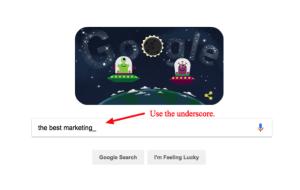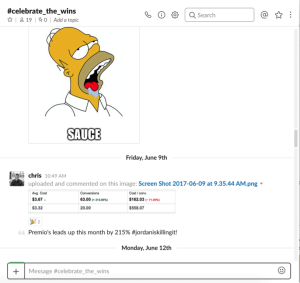I worked briefly at an agency a couple of years back and the experience was just alright. I thought I figured agency life out, but oh was I wrong. When you work for the right agency or company, you won’t feel like a chicken running with your head chopped off or looking at the clock in boredom. Agency life is exhilarating and full of opportunities to learn lessons rapidly, and I wanted to share those lessons with you.
Let The Lessons Begin:
1. Strive to learn something new every day. Stay hungry, my friends.
The team at Directive shares incessantly because sharing is caring. We use Slack and have several channels dedicated to communication between SEO specialists, PPC strategists, and more. We share the new daily learnings and successes and then we quickly test across multiple accounts if a particular strategy yields notable and scalable results. We continue to test to find out the limitations to its applications.
We subscribe and follow the best in the industry. Podcasts are fantastic for the “road warriors.” If you’re like me and live in a city “rich” in traffic (*cough* I live in greater L.A *cough*.), there is plenty of downtime in the glories of bumper-to-bumper traffic. Reclaim that time and make it valuable to your professional growth. It works out for me because I have about two hours of commute time every day, which totals almost 10 hours of learning time a week, which quickly becomes about 40 hours a month. Full disclosure, sometimes my noggin needs a break and I will carpool karaoke it and jam out to some tunes. Nonetheless, for argument’s sake, we’ll stick with 10 hours a week. Did you hear that Garrett? I’m investing in my learning. (P.S. Garrett is my boss.)
Here are a few podcasts and blogs worth following that I reference fairly frequently:
- SEO Podcast Unknown Secrets of Internet Marketing – (LINK)
- Marketing School | Digital Marketing | Online Marketing By Neil Patel & Eric Siu – (LINK)
- Social Media Marketing Podcast by Social Media Examiner – (LINK)
- Search Engine Land – (LINK)
- Klipfolio Blog on Mindful Metrics – (LINK)
- SEMrush Blog – (LINK)
- Unbounce Blog – (LINK)
- Moz Blog – (LINK)
- Hubspot’s Marketing Blog – (LINK)
- Wordstream Blog – (LINK)
Build relationships with the thought leaders in the industry. We talk to the best and have submitted to the best and now some of my co-workers are the best. I might be a little biased. I learn new things from my co-workers every day and am constantly impressed with what they do to further their knowledge and perform the best work for our clients.
Contribute to the company culture of learning. We commit time to learn each week. We have weekly office hours set aside for learning and discussing company KPI’s. The seasoned PPC and SEO Managers host weekly PPC and SEO learning breakout sessions where we pow-wow about different tools and proven methods for success.
2. As Kendrick Lamar says, “Be Humble”
Humility is a necessity with new industries, especially when new optimization tactics and hurdles arise on a regular basis because our portfolio of clients each presents unique needs. Gone is the age of cookie-cutter solutions.
Ask excellent questions to clients, but also to one another in the company. Excellent questions hold each other accountable. And ensure we are not wasting each other’s time. To establish this element, during our project phase we have a Q&A form that allows us to assess quickly the who/what/where/when/why/how of the potential client. We use the Q&A Form as a baseline for digging deeper into further research and prioritizing their needs. It also forces the client to succinctly communicate who they are and what their biggest needs are from us. After all, the client should be somewhat of an expert in their industry. Sometimes they are wandering in the dark, but that’s why we audit their existing strategies and platforms when we take on new clients just to double-check. With this little extra step of asking excellent questions, our first meeting becomes 10x more valuable because then we skip the fluff questions and are able to ask vital clarifying questions.
Here are several excellent articles on golden questions:
- The One Conversational Tool That Will Make You Better At Absolutely Everything by Fast Company (LINK)
- How To Ask Better Questions by Fast Company (LINK)
- How Asking The Right Questions Can Earn You Business by Forbes (LINK)
Do your homework. We indulge in the age-old digital marketer practice at Directive Consulting called “keyword research.” But whatever it is, do your homework thoroughly. Research is foundational to excellent work. In the case of keyword research, if we do not do this well, it sets up our accounts for failure. Research is invaluable because again it saves time in the long-term if we do it well on the front end. Research validates the viability of certain ideas before we jump down the rabbit hole. It also helps to establish credibility and authority within your client’s eyes that you care about them and their success. We use a number of different tools at Directive Consulting, but one shockingly under-utilized tool is the SERPs (Search Engine Results Page).
Here are a few tools I recommend to kick-start your research for a client or industry:
- Dive into the Google SERPs (Search Engine Results Page).
- Use the underscore in the search bar.

- The underscore helps generate other search terms and maybe more relevant search terms used by those in the industry.
- Go Tab-crazy. Some of my co-workers make fun of me for this next part. But don’t be afraid of opening tabs. I am the king of tabs. A tool to save your tabs if you go too tab-crazy is called Session Buddy. It is a groovy Google Chrome extension that allows you to save tabs, label them, and categorize the tabs. This tool is especially helpful if you are like me and open tabs on tabs and then your computer starts to slow down.
- Answer The Public; the free tool generates questions and queries that your consumers are asking and puts it into nice visual reports. This tool helps spark long tail keyword research and learn more of the industry lingo.
- Keywords Everywhere Chrome extension. The free extension aggregates the search volume, cost per click, & competition data for almost all the keyword research tools out there.
- Use the Google Chrome Incognito feature. The browsing mode in Google Chrome allows you to view search results and gain a more true to life search results page. Typically, after searching topics or a certain keyword, Google starts to jump the gun and skew results to what you have looked up in the past. Eliminate the skewing with the Incognito mode. To learn more, click here.
Never assume you know it all. Take notes as if your life depends on it. One of my favorite note-taking tools is Evernote. They have a free version, which is good enough for me. I use it for everything from documenting how to do a certain shortcut in AdWords to creating a list of To Dos for the day.

3. Breathe Collaboration
We have weekly office hours. I’ve already said this once and I’ll probably reference it again but it’s important. Gather around the big whiteboard and work things out. Upper management facilitates open-ended questions to encourage feedback and participation during this time. The office hours are scheduled once a week for only about 30-45 minutes. Nonetheless, they go a long way in encouraging healthy conversation amongst the whole agency. The office hours time nips the potential toxic cooler talk in the bud because upper-management invites feedback and constructive critique. We just went through an overall agency stack audit exercise as a whole group and it felt unifying and motivating to self-assess and set goals together. It did not feel like the all too typical top-down bureaucratic decision-making dictated by most companies.
Our teams are organized into quick-moving task forces. Each task force is outfitted with a SEO genius, PPC mastermind, and a Captain Senior consultant. In addition, we have a support structure built with those in upper management with a particular stack of PPC, SEO, or content skills who are designated the strategy gurus. We have access to them for answers to challenging questions that us, newbies, might come across while executing certain strategies.
Our desks and office layout facilitates this type of work environment. We do not have the despicable and infamous cubicles. I believe cubicles, as silly as it might sound, are the bane of collaboration. If you work in a cubicle, I’m sorry, but they feel like a sterile three-wall cardboard box of doom. “What’s the alternative?” you ask. I would like to propose to you the *drum roll please* open office but with space for solitude model (as seen above). The open office with solitude space invites communication and not to mention accountability for those with napping tendencies. I may or may not have been known for that in the past, but that is behind me because we have cold-brew on tap to keep us hyper-focused here at Directive Consulting. The solitude part of the equation is located in our conference rooms. There are some people who go to those rooms occasionally for meetings, to focus, or just to switch things up a bit throughout the day. However, we keep a pretty quiet open space and more often than not, our open space is as quiet as a library.

4. Lunch crew & team snacking is a must. Period.
Some of us are unofficially sponsored by Trader Joe’s, which is about a three block walk or couple minute drive away from our office. We snack. We share. We conquer. Enough said. On a serious note, we do have a pretty strong lunch culture at our office. Almost every day a group goes out while trying to save or achieve the elusive “ballin’ on a budget” meal. We have a lunch crew that hangs out in the big conference room and takes frequent walks to the park. Lunches as a company are good for the company focus and morale as it helps to take a break, but you’ve probably read enough posts on Inc.com about why lunch and breaks are vital to productivity.
Go to lunch with your boss time.
At Directive, we have a time planned once every two quarters or so where the CEO takes each employee out on a one on one lunch. Yes, the free food makes it a great time. But more importantly, the chance to talk about more than work and hear about passions and goals makes the time rich. It goes a long way in building trust between management and the staff.

5. Celebrate the Wins
Celebrate what you want to see more of
We had a saying at an old summer camp I attended that stuck with me: “Celebrate what you want to see more of.” Unfortunately, this does not happen enough at most companies from what I hear from friends and family. At Directive, we do this on the weekly as a whole agency during office hours but every day is filled with affirmations and celebrations for our clients. Celebration and acknowledgment of good work is vital to motivation and prevention of burnout on our team. We have a whole channel on Slack dedicated to celebrating the agencies wins, both big and small. As displayed below, we make it fun and post ridiculous Gifs to spice things up a bit.
Celebrate Creatively
Here are a few resources if you are struggling with creative ways to celebrate the wins. Consider what this office did, throw a Star Wars release party to celebrate hard work in the office where everyone comes as their favorite Star Wars character. There are a few more Star Wars movies coming out in the coming years so we still have a chance to act like junior high kids and dress up. The bottom line is that celebrating the quirkiness and personality of your team will allow space for people to be recognized in fun. Think about the ice cream party that your class won for bringing in the most canned goods for the Food Drive back in elementary school. Remember how proud and excited the class was to beat the other class? That’s how you will feel!
Celebrate the Small Wins
Just in case you still don’t believe in the power of celebration. Here is the science from Harvard Business Review on why the celebration of small wins is vital to a healthy mental state for workers.

6. Ping Pong, Kendama, or Fidget Spinner
Work and break balance is pivotal to enable optimal focus abilities.
Productivity is a hot-topic these days. The hot topic typically is work and life balance, but work and break balance is something that should be emphasized just as much. To clarify, checking your social media account and email does not count as a break. Look at this helpful infographic on the best ways to use your breaks if you are struggling to come up with some ways to refresh your noggin.
Ping Pong For Days
A number of my officemates enjoy the beautiful game of ping pong. Sometimes it looks as if we’re at the Olympic Trials. Alright, you caught us: our office is really the training ground for the USA Table Tennis team for the Tokyo 2020 Olympics.
Laugh A Little
We constantly hear laughter while people are playing ping pong. I crack up when I play because I’m not really a great player, but the game is simple and takes my mind off work for a moment which allows me to refresh. I think ping pong has gone a long way in building camaraderie in the workplace, but whatever it is for you and your staff, find something that brings out the competitive juices and the laughter. I resisted table tennis for awhile and would throw around the kendama so find your personal kendama perhaps. Fidget spinners were a thing or maybe they still are a thing. Regardless, find something to remove your mind from work and that makes you smile or laugh.
The company throws quarterly office events like beach days and Christmas parties. Again, who doesn’t enjoy getting paid to hang out and snack at the beach? Assemble an office party planning committee, like The Office, and put together some intentional fun time away from work.

7. Distinctions between types of agencies
Communicate Boundaries
We are a consulting agency first, and then an execution agency. Matters tend to become messy, however, when a client starts to view us as purely an execution agency because instead of being able to craft and orchestrate the big picture, we become bogged down in the little tasks. In the contracts before projects, we make sure deliverables and timelines are clearly communicated and agreed upon. Make this a priority and a number of headaches will be removed.
Become Specialists
There are distinct differences between ad agencies, marketing agencies, PR agencies, and all the other agencies. Directive Consulting is an SEM consulting agency. We perform a specific niche of marketing, Search Engine Marketing, which is a specific form of Digital Marketing. Not only do we do this, but our target market is very specific as well: B2B companies. It makes it easier as an employee to understand the big picture and be on board for every client and project because I know who we are and what we are trying to accomplish. I know what to focus on and prioritize in my day-to-day and weekly efforts. We are not trying to deliver every element of the Marketing Mix.
Commodity versus Specialists
Avoid becoming a commodity and keep the mindset of specialists. You are not a commodity waiting to be told what to do but are a specialist that uncovers valuable insight that the client would not see without you. In order to combat this commoditization, we make sure to always emphasize the consulting aspect of our agency. On top of that, it is emphasized that we think and analyze for ourselves because really in consulting there are no real best practices. Every client is unique and a variety of factors make one “best practice” invalid for another situation. Curious about what else it takes to avoid commoditization, take a gander at this succinct piece on 5 Ways to Avoid Commoditization.
8. Not all clients are the right fit
Is the client king? Yes, in one sense they are. However, there is a reason you are the consulting agency and the client is coming to you for work. They are not having the success they would like to see in lead quality and opportunities. They need help and it sometimes is a state of emergency where their immediate performance dictates whether they get fired. There are desperate clients and clients who are trying to be ahead of the curve. The reasons for why a client comes to us differs. Bottom line, we discern whether the situation is a positive one and fits within our scope or not before signing a contract.
Sometimes it is time to let a client go. Sometimes the work a client requests is outside our scope or is outside their pay range. Be generous and helpful, but sometimes the best deal is no deal. Cut ties and move on. Similar idea to what Jim Collins proposes in Good to Great for building the team, it’s easier to get the right people on the bus then it is to get the wrong people off the bus. The client portfolio is the same way. Manage them well.
9. Engage in customer delight
Fight the overpromise itch. This comes from my days in marketing classes at school to freelancing consulting gigs but has remained true even into my time at Directive Consulting. Customer delight does not mean overpromise. In fact, this might mean under promise (or at least pause and ask the team) and set the expectation within reason. Set appropriate and reasonable deadlines.
Communicate deadlines. Do what you say you are going to do and then do it when you say you are going to do it. Short and simple. Easier said than done, but awareness is the first step in action.
Queue programmatic recommendations and strategy to test. Another point to consider is being proactive in management and making recommendations to the client. Don’t sit and wait for the client to bring action items to our attention. It sounds obvious but we have had moments where the client starts to bring the whole kitchen sink with them to the table and wants us to suddenly solve other items. Manage the schedule and prioritize proactively because if deliverables are not delivered due to a focus on the kitchen sink, then we lose. How we do this practically at Directive is through weekly updates delivered via write-ups and phone calls. We also have a detailed action list in Asana where we track our projects.
10. Mindset Matters
Attending conferences and speaking at events as a thought leader is a value Directive Consulting holds dear. Several weeks ago, a teammate flew out to Dallas and shared a bit on the findings that we have gained from our various projects. Just last week we sent another team to a large national B2B conference in Boston that we sponsored. At an agency, opportunities to grow both internally and externally come up more than I ever imagined.
Attitude is everything. The big element that I wrestled with is the mindset. Take ownership. Be proactive. Beyond that, I realized that like anything in life if you want to excel, then the time and mental commitment needs to relentlessly be applied on the daily. Like most people, I played sports growing up and when I played those sports I committed to them. I changed my diet. I worked out consistently. I watched film of myself and the greats. It was the daily decisions that allowed me to excel. My daily decisions now include taking small steps with different PPC, CRO, and digital marketing courses going a long way. I need to slowly add to my education and knowledge base to develop. Directive allocates time in the day to learn but also offers paid resources that we have the choice of taking advantage of to become the best digital marketer we can be.
Another facet of professional growth at Directive is that we’ve worked to develop our own personal thought leadership, as excellent work brings more companies who want our work. We’ve been featured in Salesforce, Marketo, Moz, Convince and Convert, Marketing Land, Search Engine Land, SitePoint, Wordstream, and more. Co-workers have spoken at Digital Summit, SMX, State of Search, 3XE Digital, Share 16, MozCon Ignite, Big Digital, General Assembly, and others. If you want it, the upper management can offer ways to make steps in that direction.
More thought leadership and work means credibility, hiring new people, promotions, and further opportunities to lead. Recently, two co-workers received well-deserved leadership promotions to where they are overseeing all PPC and SEO quality control. People with hard work and diligence receive promotions to Senior Consultant or other management roles.
Conclusion
The lesson I learned in my first six months at my new agency is to not judge an agency by its cover. Look for one that does things right: lunches together, collaborates, encourages, challenges, and so on. If you forgot, what I mentioned in my brief post just look for the bold points above. Carry on and best of luck to friends already in the agency life or considering it!
-
Sam Becker-Miyadai
Did you enjoy this article?
Share it with someone!

